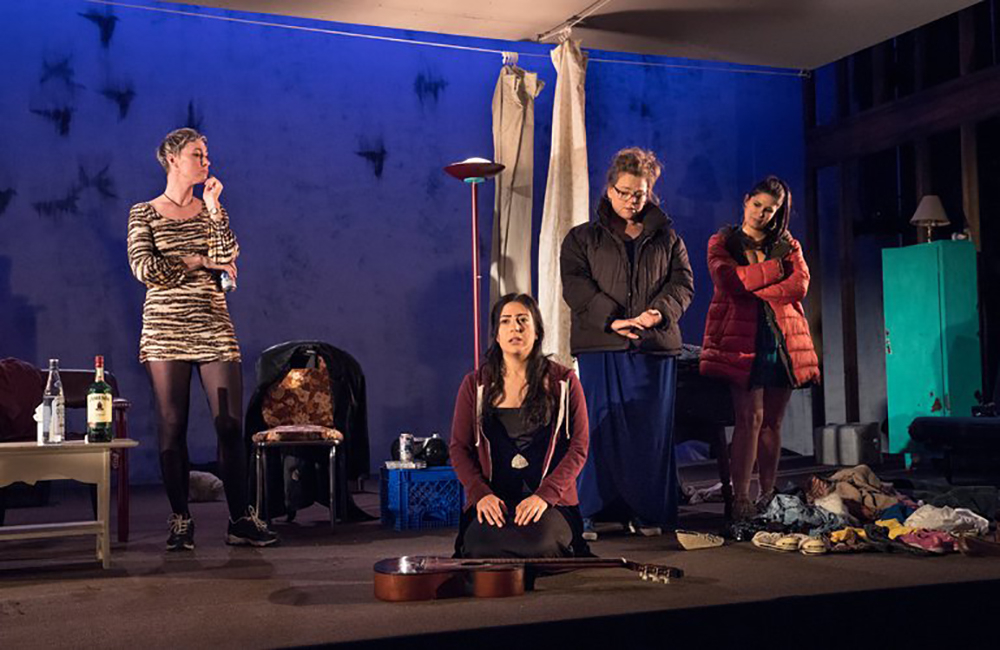
She was five when she left Poland for America and seventeen when she went to the theatre for the first time. She is now a much sought-after playwright and has recently won the Pulitzer Prize for her stage play Cost of Living. She told us about the path that has led her from her hometown of Bytom to theatre stages in New York.
She considers herself both Polish and American. “My whole family still lives in Poland, only my mother and my stepsister live with me in the United States,” says Martyna Majok. “I started school in America, which is why I express myself most easily in English, but I have never given up the Polish language. I travel to Poland whenever I can, and I try to visit Bytom each time. The house I was born in, the one in which my mother too had come into the world, is still there in Wyspiańskiego Street.”
She grew up in New Jersey, in an immigrant working class district, whose residents came from different countries, so there was nothing unusual in being immersed in several cultures at the same time. Most of her friends spoke two or more languages at home. “My theatre playsare usually about people I met there: the immigrants, workers and single mothers,” she explains. “In most theatrical stories, such figures are considered secondary; in my plays, they occupy a central position. I have always had a feeling of being ‘in the middle’. Technically speaking, I am an immigrant, even though I came here as a child and even though it had not been my own decision but one made by my mother.”
Martyna witnessed the difficulties experienced by her mother, an immigrant factory worker who would earn extra money by cleaning other people's apartments and taking care of the elderly, but she also had her own experience of being a ‘child in exile’. This helped her to form a bond with people who come from many faraway places and countries: “There is no such thing as one uniform ‘immigrant model’; rather, there are many ways of experiencing emigration and different reasons that may affect the decision to move to a foreign country. But there are a lot of similarities, too. The fact that I come from Poland and emigrated to the US is perhaps one of the most important experiences defining me and my writing. What affects me most powerfully are the stories and experiences of my mother. I see beauty in what others considered to be a ‘broken’ language.” For many families who were trying to settle into the American society, English was the second language, and most of them learned it through everyday life and work rather than in language courses offered by schools for newcomers. I often had the impression that the way in which they perceived the world and expressed it in their new language was more veracious than correct pronunciation and a perfect accent. That has influenced my theatrical style.


From little scenes to big stage
She went to the theatre for the first time when she was 17. She paid for the ticket with the money she had won in a game of pool. It was the Cabaret musical, starring John Stamos, performed at the legendary Studio 54 Club in New York. She was enthralled; though, in fact, it was but one of the elements in her growing up process. “I’ve always enjoyed reading and thinking up stories. I expressed my creativity through drawing and writing,” she recollects. “My state school didn't even offer drama classes; I didn't have a chance to try drama until I went to college. As someone raised in modest financial conditions, I was full of doubts, for an artistic career is a risky path to follow. I know that my mother was also worried about my plans concerning theatre, but she never made any attempt to deter me from that decision.”
In high school, Martyna would write dialogues for an English learning programme for immigrants and their children (at the bank, at the café, at the shop etc.). She did not realise then that what she was doing was in fact playwriting. At Chicago University, she went to drama classes and would take part in theatrical performances. “My home wasn't an oasis of peace. My stepfather turned out to be a violent man and I would witness situations which shouldn't take place in an ideal world,” she recollects. “It was beyond my understanding why anyone would do such things to another person. I started ‘collecting’ dialogues from my life. This helped me to get some detachment from the past and to give thought to the event mechanisms in which my mother and I were involved. I used some of these mechanisms to write drama for the stage. It proved to be extremely difficult, but it turned into an obsession which I wasn't able to give up any more.”
Consequently, Martyna made the decision to study at the Yale School of Drama.“I realised how the scenes which were based on my personal experience related to some ‘bigger’ narrations that were manifesting themselves in society and culture. For this reason, most of my plays are personal and political in character, but the political aspects in them emerge from the personal.”
Black comedy, clear objective
Martyna Majok's plays have been performed in various theatres in New York and on many stages throughout the US, including Los Angeles and Chicago. They can be identified by deep social involvement and sympathy for the economically and socially excluded who have not deserved their fates. To give an example, Majok’s earlier award-winning play titled Ironbound,tells the story of an immigrant Eastern European woman and is based on some of the experiences which the author's mother had gone through in America. The play titled Queens, which was written for the Lincoln Center in New York, is also about immigrants; they come from different countries (including Poland) and live together in Queens, trying to support each other in their struggle with everyday life.

This year's Pulitzer Prize went to Majok for Cost of Living. The play shows two couples: an unemployed trucker and his wife, who has been paralysed after an accident, and an affluent student suffering from cerebral palsy and his caregiver.
“The success of this particular play is especially important to me. Theatres were afraid to stage this production; it is rarely the case that a stage drama requires its producers to cast not just one but two disabled actors. That’s why I am excited, for I hope that the Pulitzer Prize will help it to reach a wider audience and that it will create more opportunities for disabled actors.

Martyna usually writes on issues related to social class and origin, but she has found out that the American audience (dominated by the so-called upper class) is often unresponsive to such stories. “There is the widespread idea of the American Dream, according to which you can achieve everything if you work hard,” she says. “But throughout my life, I’ve been observing people working hard—very, very hard—and it is not always the case. Yet it’s undesirable in America to discuss that issue openly; some spectators take it as an accusation against their lifestyles. So I’ve learned that I should use humour in my stories, for otherwise nobody would want to hear them. I often describe the darker side of life, but my characters aren't self-pitying; they have no illusions about their life situation and are able to make jokes about it. This is a black comedy. Perhaps I have it in my Polish genes.

A female Głowacki
Martyna is aware that her work is being compared with plays by another Polish ‘immigrant’ in the American theatre—Janusz Głowacki: “I was excited by the fact that Cost of Livinghas been produced in the same theatre which in 1987, exactly 30 years earlier, staged Głowacki's Hunting Cockroaches.I love such invisible connections—countries, art, shared places and experiences—which join strangers beyond time in a miraculous, unexpected way.”
In 2016, Martyna attended the Divine Comedy Festival in Cracow: “It was my first time watching Polish performances in Poland! I had seen several productions in New York and Chicago, such as Wormwood by Teatr Ósmego Dnia, In the Solitude of Cotton Fields directed by Radek Rychcik or the Polish adaptations of Sarah Kane's plays. But for the most part, I simply read Polish plays—the classics and the recent ones. Kantor and Grotowski are big names in America; I have seen many of their works in archival versions.”
Together with Szymon Wróblewski from the Adam Mickiewicz Institute, she is discussing plans for a new play that is going to be inspired by classical Polish drama, perhaps Wyspiański or Gombrowicz. Next year, her plays are to be performed on Polish stages for the first time, among them Ironboundin the National Theatre in Warsaw.

“It's interesting how different American theatre is in comparison with Poland or Britain,” Martyna observes. “First of all, high ticket prices, especially in big theatres, have put off and excluded the so-called working class, which means that American audiences consist mainly of upper class spectators. This can distort the reception and the perspective of the performance, precisely because of such peculiarly profiled audiences and critics. In the States, even theatre artists can’t always afford to buy themselves theatre tickets!”
Life after the Pulitzer
“When my agent called me to inform me about the prize, I thought that he was joking. This had always been my dream, so it didn't sound real,” Martyna says. My husband [actor Josiah Bania – Ed.] was with me at that moment. We were getting down to settling our taxes but we dropped everything to celebrate with friends. It was one of the best days of my life. Another one was May 30th, the day of the award ceremony, which I attended with my mother and husband.”
I ask Martyna what has changed in her life after winning the Pulitzer Prize. “Everything and nothing,” she answers. “I’ve received a whole host of emails, text messages and phone calls from friends and colleagues. The best thing was the opportunity to talk to people I hadn’t had any contact with for a long time. I found public attention a bit overwhelming; I’ve had requests for more interviews than I’ve been able to give. But what I write about and how I do it—that has not changed. After celebrating the success, I simply went back to work.”

Martyna has recently finished a new play, titled Sanctuary City, which is going to premiere in New York in May 2019. She is working on librettos for two musicals. One of them is about Chernobyl and will be shown at the Public Theatre in New York. She is hoping for a film based on Cost of Living.
“I have so many commitments to fulfil that I’m not quite sure when I’m going to do everything. I haven't been getting much sleep lately,” she says and adds that her author’s role is not restricted to sitting at her desk. “I’m very much involved in the premiere productions of my plays. I am there at every rehearsal, correcting the text, learning from actors and making changes. Playwrights create in solitude, and the phase I like most is going to rehearsals and being part of a community. I love it!”
Martyna Majok – Polish-American playwright, winner of the 2018 Pulitzer Prize for Drama. She was born in Bytom in 1985 and emigrated with her family to the United States in 1990. She graduated from the University of Chicago and the Yale School of Drama. She also studied at the Juilliard School. She has won the Charles MacArthur Award, the Lanford Wilson Award, the David Calicchio Emerging American Playwright Prize and the Greenfield Award (as the first woman to receive this recognition). In 2018, she has won the Pulitzer Prize for Drama for her play Cost of Living. She lives in New York and is married to actor Josiah Bania.
Translation Elżbieta Pawlas/Solid Information Solutions


Zaloguj się, aby zostawić komentarz.